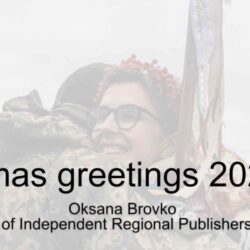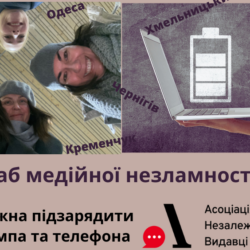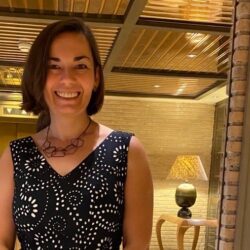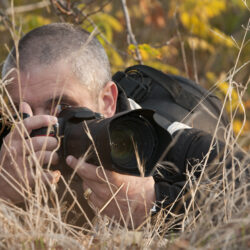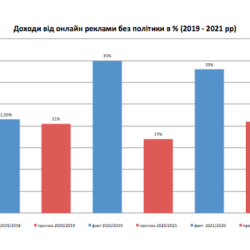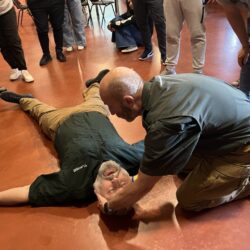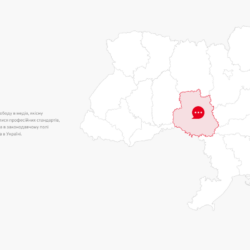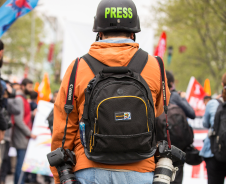
During the first days of the war, russian troops entered the town of Vuhledar, Donetsk Oblast. Until now, the territory remains under russian occupation.
A business of the local entrepreneurs, developed over many years, suffered great losses and then ceased to exist. An important business at all times, a funeral service, did not withstand russia’s invasion, either.
Entrepreneur Mykola Vlasenko and his worker Ihor Bondar retell how their funeral business worked under the occupation.
The names, surnames, and the name of the town where the events described in the article took place were changed at the request of the people mentioned in the article because their relatives are still in the occupied area, and their lives need to be protected.
“The dead were buried as quickly as possible, risking the lives of the living, without mourning and relatives being present,” says Mykola Vlasenko, the owner of one of the local funeral service businesses:
Mobile communication stopped working during the first days of the war when enemy troops entered the town. I was always on duty in my workplace or left a note with my address where people could contact me regarding funerals.
It was difficult to provide normal services as before. Even not all the orders could be taken due to the constant shelling of the town, the movement of military equipment, and the presence of armed soldiers on the streets of the town and the entire district.
When mobile communication became available again, it became easier to coordinate work. But other problems emerged. The attitude of the occupiers, who interfered in any affairs of local residents, including my workers, did not change for the better every day. The invaders were conducting more and more thorough searches of people and motor vehicles. Each burial process was always associated with a risk to life.
When the town was shelled by multiple rocket launchers, the boys were hiding in a grave dug for the dead.
Several times while working, we witnessed the shelling of the town by multiple rocket launchers. Shells came from positions located several hundred meters away from us. At that moment, the boys were hiding in a grave dug for the dead.
Burials were carried out as quickly as possible, without mourning, without relatives being present, and without other traditional rituals. The priests left the town earlier.
The morgue was closed by the occupiers. It became impossible to identify a deceased person. No one could issue burial documents proving the identity of the deceased. Burials had to be carried out in contradiction to the laws and regulations without death certificates being issued. Then we started working as volunteers; many were buried for free or for the money people could pay.
The number of dead people was increasing every day. We had to bury those who died from bullets, debris, or those who came under artillery fire.
One day I was asked to bury a man whose body had been lying on the ground for several days. It turned out that the young man was simply shot dead for no reason.
The number of young people who died from violent death was significantly higher than the number of those who died naturally. Apart from us, other funeral services continued to work in the town. But what we saw with our own eyes was enough to understand that this was not the end of russian atrocities. We worked in the occupation for almost two months and couldn’t stand it anymore.
The occupiers demanded that we hide their heinous crimes, threatened to massacre the family…
Every day and every night, we experienced terrible shelling. This affected the mental health of my young children. It happened that when the shelling began, I lay down on my children to protect them with my body from the debris.
Russian soldiers visited my home more and more often.
I realized that I would not be able to watch how our townspeople, most of whom I knew, were being killed. I understood that further work in the occupied territory would involve cooperation with the enemy, which I resisted with all my heart. My family decided to move to the territory controlled by Ukraine.
The occupiers confiscated the car, and the office premises were also damaged due to the shelling.
With the invasion of russian troops, any business in our territory ceased to operate; only funeral services were provided. They could be provided as long as cars were not taken away. It became impossible to carry out burials without motor vehicles. I lost my work vehicle. The occupiers confiscated everything. The shelling also damaged the building of my company.
As far as I know, some of our competitors still stay in the town and continue to operate even today. As for me, I can resume work only if the territories are fully liberated. It is possible to restore and rebuild everything; the main thing is to wait until victory.
“While working in the occupied town, we witnessed terrible deaths. We were forced to do what the orcs demanded,” says Ihor Bondar, an employee of the funeral service:
Due to the occupation of the town, all businesses stopped working. The factory where I worked was damaged, too. I had to look for a job. I had few options to choose from in this situation, so I got hired by a friend of mine, the funeral service owner.
Other people came to work with me every day, depending on the amount of work. Our duties included digging a grave and transporting and burying the dead.
During the first few days, we buried people who died by natural death. But soon, terrible cases began to occur. We had to bury people who died as a consequence of the invaders’ violent actions.
In such cases, we were forced to do what the “customer” demanded. One day, russian soldiers came to the company on an armoured personnel carrier (APC) and, at gunpoint, “asked” us to bury two dead bodies. The occupiers said that those were the bodies of drunkards. As it turned out, these were ordinary residents of our town.
When we saw their bodies, they had gunshot wounds and many bruises. They were young people, a man and a woman, who must have been sexually abused before their death. Everything that happened there does not fit into the understanding of reality. I can’t tell you all the details because they are horrible.
The occupiers were interested in burying these people as soon as possible. They accompanied us to the grave and waited until we finished the burial. It was also impossible to photograph these bodies. But I had to see terrible things I could not erase from my memory.
The body of another man, who was buried, was found just near a road where he had been lying for an unknown number of days.
One day we had to bury a refugee who had lived in our town for several weeks. His body was found just near a road where he had been lying for an unknown number of days. My manager covered the cost of the burial of this dead man.
Lonely pensioners had to be buried according to the same principle. Their children, for example, might have left. In this case, the dead person’s neighbours contacted the company, and we did the burial.
I know cases where people who had no money to pay for the burial buried the dead on their own. The relatives of the dead simply buried the bodies in the yards.
I will never forget another death that I witnessed. A blast wave killed two young women. The girls had just left their house searching for a mobile communication network when there was an explosion nearby. They did not escape … I personally knew the girls; their children became orphans.
We lived in an atmosphere of depression, despair, and sadness.
An atmosphere of depression, despair, and sadness was up in the air. No one could do anything about this. We often worked, so to speak, like robots, trying to get away from reality. But it was impossible to get rid of the feeling of helplessness and hopelessness.
My duties included visiting the morgue while the facility was open. It was an awful scene. There were many bodies there. They were everywhere, just lying on the floor. Killed russian soldiers were also among the dead civilians. At first, the occupiers allowed us to enter the morgue, but later, after the rotation, they didn’t. The bodies of the dead were taken to the doorstep in sacks. They were given to relatives. Sometimes they could not be taken for several days. I don’t know the reason. They were transported to the cemetery in a bus. The company still had coffins at that time.
One day we were at the cemetery digging a grave when shelling from heavy weapons suddenly began. Rockets from multiple rocket launchers and cluster shells flew above us. We had to jump into a dug pit and hide from shelling there.
Destroyed houses, burned cars, and killed civilians…
In addition to burials, we tried to help people who suffered from shelling. One local businessman lost his home, business, and property in an instant. His house was blown up by a rocket. Everything burned down; the people survived because they hid in the basement in time. Two cars in the garage burned down. A blast wave destroyed even neighbouring houses. We helped him transport the remaining items that survived the explosion.
We worked according to the curfew imposed by the russian fascists. When work continued until late at night, I risked being unable to come back home in time. Unfortunately, a man who worked for another burial company was shot dead when returning from work after the curfew began.
Orcs exerted psychological pressure: they said it was the Ukrainian military that was firing at us while the russian troops were protecting us.
Living in an occupied territory, you risk your life all the time, no matter what you do. We ignored the danger trying to do our job as long as we could.
The occupiers’ pressure was constantly increasing. If during the first weeks we were let through the checkpoints without searches, later the requirements were becoming stricter. The documents, telephones, and company vehicle were checked; we were stripped and examined. We understood that later we would receive other “orders” from these animals. So we decided to leave our homes and town and moved to the territory controlled by Ukraine.
Author: Liudmyla Sova
Interview by Vlada Dniprovska
